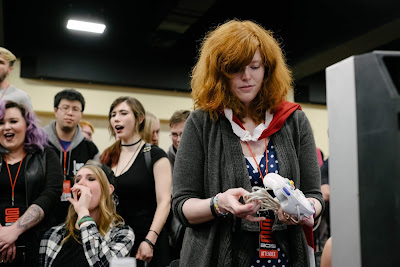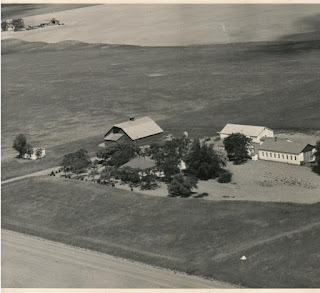Esports Frontier
 |
| Sarah-Charles Morrow |
I read about Sarah-Charles “Charlie” Morrow in our local paper. She’d just been hired as the first esports coach for Peninsula College.
I needed to meet her—and find out more about this whole brave new world of esports and video games. We met over coffee and I told her about my grandson and how much he enjoyed gaming. He's focused on improving, and shares this time with his close friends—all online.
Charlie told me players develop fast decision making skills—mentally calculating up to 100 actions per minute. My grandson enjoyed Fortnight. Now he has another favorite. He’d like to compete in tournaments.
Esports is a lucrative and competitive world. Just this last summer, 16-year-old Kyle Giersdorf won the Fortnight World Cup. It earned him $3 million dollars.
Fortnight is one of the most popular games ever. There are 250 million players and it has amassed billions in revenue through in-game purchases.
Charlie understands why parents worry about video games—their content and the time spent playing them. But if addiction is a concern—look for the warning signs—obsession, increased isolation, and slumping grades. Yet, esports is taking off in high schools and colleges across the nation.
The High School Esports League (HSEL) encourages students to form leagues in their school and have esports competitions with other high schools. There are STEM (Science, Technology, Engineering and Math) grants to help pay for the programs.
The University of Washington recently added another sport to its competitive line-up: Esports. The UW is the largest public college in the nation to have a dedicated esports arena—1000 square feet of high-end gaming computers. Furthermore, the college is offering scholarships for academic and career development in the gaming industry.
Charlie has competed both regionally and nationally in Super Smash Brothers Melee competitions. She’s organized tournaments, handled the logistics for venues and games, and earned her Master of Arts degree in Performance Psychology.
She’ll be the first to tell you that there is a future in gaming—and not just as a player—there’s a need for game designers, performance consultants, and plenty of opportunities in computer technology.
Advice for parents? Charlie recommends getting kids to start an esports club at school. They’ll compete just like other school sports. Not only will they refine their competitive skills, they’ll be learning all the communication skills that go along with forming an organization.
As a bonus, they may even qualify for college scholarships. Charlie is part of a global gaming industry—and our video game-loving kids and grandkids are right behind her.
Images in order of use: Lilian Chen, Florian Olivo, HSEL screenshot, Magnus.





